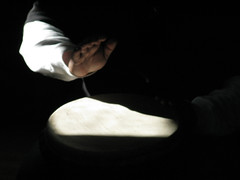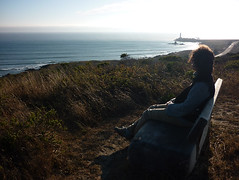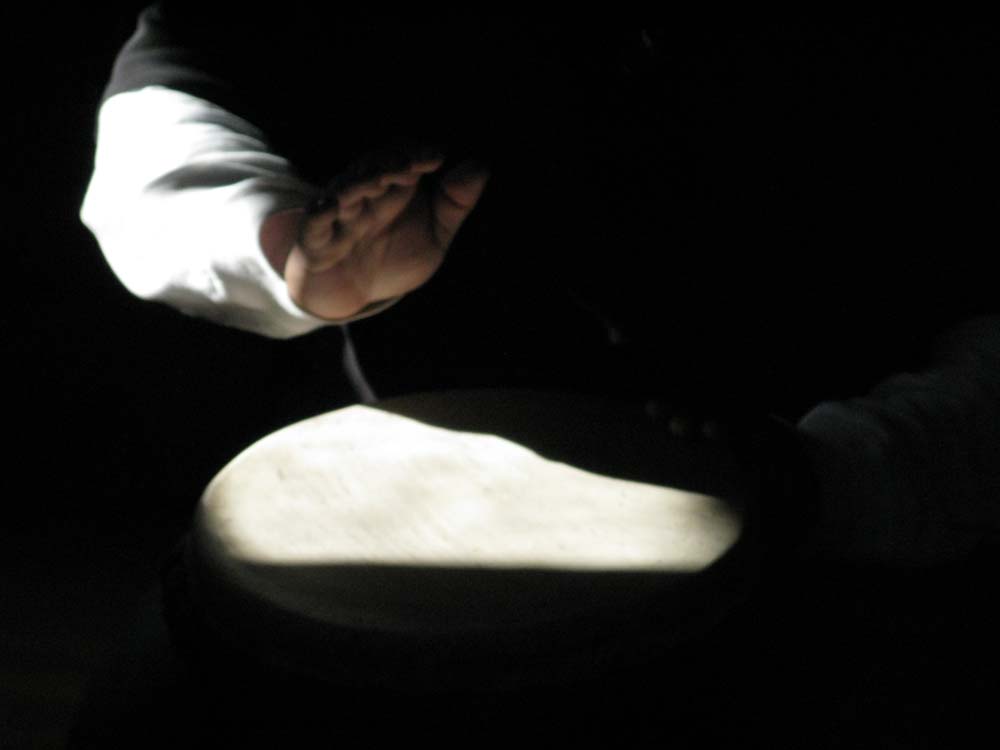An interview in two parts with author and shamanic teacher Sandra Ingerman
Part II
Awakening to the Spirit World:
The Shamanic Path of Direct Revelation
Paperback, 360 pages
Sounds True (February 28, 2010)
available at Amazon
More about the author at sandraingerman.com
Yesterday’s segment of the interview focused on how to overcome personal despair and defeatism in light of the tremendous problems humanity is faced with. Today I’m posting Ms. Ingerman’s fascinating insights into Shamanism and how we might use this ancient practice to heal our ailing collective spirit.
Sven Eberlein: Let’s talk a little bit about shamanism. The imagery of oil and its darkness seems very symbolic/archetypal. What part of our consciousness does the oil spill in the Gulf represent? Are there any shamanic interpretations for the darkness coming from deep down below the surface of the earth?

“Shamanism teaches us that everything is connected, there’s only one web of life, there isn’t an us and them.”
Sandra Ingerman: We all have a spiritual part of ourselves that’s immortal, a divine light that radiates like the sun and the stars above us. On the other hand, we all have the shadow aspect. Just like nature, the sun rises and then sets again, leaving the sky dark. The shadow nature is in the parts of ourselves that we often keep hidden. The angry parts of ourselves, the parts that feel betrayed or disappointed. I’ve written in my own work: “We’re the exploited and we’re the exploiters.” A lot of what’s coming up with the Gulf right now is that people feel the environment has been exploited. Well, whenever something is being exploited on the outside we have to look at the part inside ourselves that is the exploiter also, that tries to manipulate the environment, our environment, our light, our world, and how to bring that back into harmony and balance. Basically, what we’re seeing from a shamanic point of view is the shadow state coming back and a reflection of the imbalance of ourselves that needs to be looked at.
Eberlein: A hypothetical: If you were to guide a shamanic journey for western capitalism, how would you approach it? What would you take with you? What power animals do you think might show up? What would your diagnosis and advice for healing be?
Ingerman: There could be a couple of ways in which I would approach that. One is, I would tell people to take a helping spirit, whatever power animal or teacher they work with, and ask to meet somebody who represents to them a capitalist figure, someone whose philosophy they don’t respect…
Eberlein: …like someone from Wall Street?
Ingerman: Yes — and to go meet that person as a human being. See what’s driving him or her, what might be the wound that he or she is carrying. Then go inside yourself and find that same wound, find that there isn’t an “us” and “them.” That’s what’s asking to be healed right now: we’ve moved into this “us and them,” and there isn’t — it’s just an “us.” I actually did this journey once with George Bush where I got to have compassion to see what brought him to the place that he got to, and then I journeyed inside of myself to find that same place that needed healing within me, that would make me act out in a way that I didn’t particularly appreciate. Shamanism teaches us that everything is connected, there’s only one web of life, there isn’t an us and them. It’s all the same. Shamanism is the original spiritual tradition that talked about unity consciousness. Quantum physicists are talking about it now, but shamans have been talking about it for many thousands of years. So the journey would be to go see the wounding that created this capitalistic society of “I need more” from the outer world, because there’s a bankruptcy in the inner world.
Eberlein: That’s very beautiful imagery. It reminds me of the archetype of Pluto in evolutionary astrology, the going into the wound, bringing it out, then processing and healing it. Basically accepting the wounds. It’s very deep and powerful work. Speaking of Pluto and its current move into Capricorn: Could you connect the dots between these three words: Shamanism, ecology, responsibility?

Ingerman: Well, shamans — and I’m not trying to over-romanticize shamans, they have their own problems, too — but in a shamanic culture people realize that they’re one with nature. Shamans and people who live in shamanic cultures live with honor and respect for nature, for the earth, air, water, fire and the sun. When people wake up every day, they give thanks for the life they are given, and they walk on this earth with deep honor and respect for that which gives us life. I truly believe that if everybody on the planet started to give thanks for the life we receive, the air we breathe, the life that water and the sun bring to us, a lot of the environmental problems would clear up pretty quickly. I know it sounds very simplistic, but as we’re on the earth from a place of dishonor, we pollute that which gives us life. We forget that it’s the sun that’s giving us energy, not the electric system. We’ve disconnected from nature and we think we’re separate, but we’re part of nature, we’re all one with nature. Shamanism and ecology and responsibility have to do with honoring that which gives you life, and then start to take action. The responsibility part is that you don’t pollute the air when you’re dependent on the air for your life. You don’t pollute the water when you have to drink it. You don’t poison that which feeds you.
Eberlein: It sounds like the lessons aren’t that complicated, that much of the solutions lie in getting in touch with ourselves and realizing we don’t need very much. Perhaps we don’t need to invent all this new technology to make up for the mistakes of the old technology…
Ingerman: I do believe that as a collective, if we learn how to focus our thoughts and our imaginations, we don’t need technology to fix what we’ve done. I think the spiritual work of focusing our thoughts and our dreams and imaginations together will create the changes that are necessary, once we get the wake-up call that it’s time to shift and live in harmony with the rest of life.
Eberlein: So would you think that if anything is to happen or if there are any lessons to be gleaned from the 2012 shift, it’s about an inner transformation that we’re already going through?
Ingerman: Absolutely! As a scientific culture we take everything rationally, which means we take everything literally. I do go back to the song you quoted, I do believe it’s the end of the world as we know it, it’s not the end of the world. As we’ve loosely been talking about 2012 and a change in consciousness and a new way of living, we’re not just going to wake up one day and all of a sudden there’s a new life (laughs).
Eberlein: Anything else you’d like to share?
Ingerman: I always like to let people know that the spiritual work we do does make a difference, and it really is where we have power to create change right now.
Eberlein: I really appreciate talking to you, thank you so much.
o~O~o~O~o~O~o~O~o~O~o~O~o~O~o~O~o~O~o~O~o~O~o~O~o~O
Check out Sandra Ingerman’s monthly column The Transmutation News. Ms. Ingerman also appears in The Invocation, a documentary about God and World Peace, directed by Emmanuel Itier, and is in the process of co-authoring a companion book to go along with that movie.









I found your hypothetical question gripping and couldn’t wait to read Sandra’s answer–and it was powerful: find the same wound within yourself and heal it with love. Everything always comes back to what we are within ourselves…
Thanks for this interview–it’s one of the most meaningful I’ve read.
Thanks for reading and the compliment. That was definitely the question I was most curious about the answer as well. She ran with it and I thought her answer made a lot of sense.